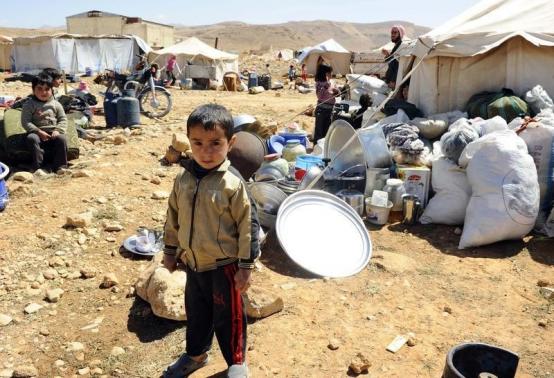
CREDIT: REUTERS/HASSAN ABDALLAH
The biting cold and bitter hunger did not stop a group of Syrian refugee children from wandering about near their camp site in Lebanon’s Bekka Valley to look for what they declared was “the magical tree.”
One of the children was Christian, and the rest were Muslim, so he was their guide.
They didn’t find an exact match, but found a tree nonetheless that was small with bushy branches strong enough to decorate.
Using orange peel, empty soda cans and cut-out potato chips bags, they turned the humble tree into a colourful kaleidoscopic record of what they last had for dinner.
There were no gifts under this Christmas tree, but that didn’t dampen their mood as they danced around it and made a wish.
“It is the same wish they make at every special occasion, they want to go home,” said my friend, who works with refugees in Lebanon.
She told me this story about the search for the Christmas tree as just “one of those things” that children did.
Though humanitarian officials note that most adult Syrian refugees have stopped hoping for better days, the children keep on wishing and hoping. They are the last ray of light and love in the continuing gloomy and deadly story of war. Yet it is they who suffer the most in a crisis.
More than 7.3 million Syrian children have been affected by the conflict. That includes 1.7 million child refugees.
No wonder that Unicef declared 2014 as one of the very worst years for children.
As many as 15 million children are caught up in violent conflict in the Central African Republic, Iraq, South Sudan, Palestine, Syria and Ukraine, including those who are internally displaced or living as refugees. They are even being targeted while at school, as we saw last week in Pakistan, where 132 children were gunned down by terrorists.
With Christmas being celebrated today, why not do something a little bit different this time? Why not give a few moments to someone in need?
If it is difficult to help a refugee family directly, or donate to the various agencies working on the ground, then look to see who is in need in your neighbourhood. It could be something as small as a slice of cake accompanied by a smile. Or look in your own household, and surprise a maid or driver with a gift. These small acts of kindness go a long way.
As for me, I will be spending Christmas day with my parents, and a few hours with my father at the hospital as he undergoes kidney dialysis. There are so many families with a loved one reliant on the procedure. It drains the soul and can trigger depression as dialysis lasts four to six hours a day, three to four times a week.
Often there are several young patients at the hospital and I will take in some balloons and toys for them. Children and adults, we will play games like charades – I will be acting out and the patients will guess. I will probably end up getting kicked out, but at least I will have given them some little pleasure.
Unlike so many across the world, we can be thankful for having a roof over our heads, for something as basic as socks and shoes that warm our feet, and to be surrounded by loved ones.
For those who lost someone dear, every holiday and special occasion is a painful reminder of who and what they lost. Include them in your celebration so that no one feels alone on a holiday that revolves around love and giving.
The National

Leave a Reply
You must be logged in to post a comment.